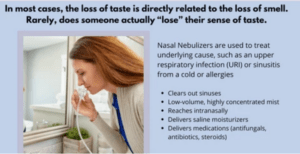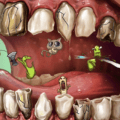Loss of Smell: Causes, Treatment, and Tips to Restore It

Losing your sense of smell can be a frustrating and isolating experience. You may find it difficult to enjoy food, interact with others, or even stay safe. Fortunately, there are a number of causes of loss of smell, and many of them are treatable.

What Is Anosmia?
Anosmia is the medical term for loss of smell. It can be partial or complete, and it can be temporary or permanent. Anosmia can affect one or both nostrils.
 Causes of Loss of Smell
Causes of Loss of Smell
There are many different causes of loss of smell. Some of the most common causes include:
- Upper respiratory infections: Common colds, the flu, and sinus infections can all damage the olfactory nerves, which are responsible for smell.
- Head injuries: A blow to the head can damage the olfactory nerves, leading to anosmia.
- Allergies: Allergies can cause inflammation in the nose, which can interfere with smell.
- Smoking: Smoking can damage the olfactory nerves, leading to anosmia.
- Certain medications: Some medications, such as those used to treat cancer or high blood pressure, can cause anosmia.
- Hormonal changes: Changes in hormone levels, such as those that occur during pregnancy or menopause, can lead to anosmia.
- Degenerative diseases: Degenerative diseases, such as Alzheimer’s disease and Parkinson’s disease, can damage the olfactory nerves, leading to anosmia.
- Rare genetic disorders: There are a number of rare genetic disorders that can cause anosmia.
Treatment for Loss of Smell
The treatment for loss of smell depends on the underlying cause. If the loss of smell is due to a temporary condition, such as a cold or the flu, the smell should return once the condition has passed.
Treatment may be more complicated if the loss of smell is caused by a more serious condition, such as a head injury or a degenerative disease. In some cases, surgery may be an option to restore smell.

Tips to Restore the Smell
There are a number of things you can do to help restore your sense of smell:
- Avoid smoking: Smoking can damage the olfactory nerves, so it is important to quit smoking if you want to improve your sense of smell.
- Manage allergies: If you have allergies, it is important to manage them so that they do not damage your sense of smell.
- Use a saline nasal spray: A saline nasal spray can help to clear mucus and debris from the nose, which can improve your sense of smell.
- Smell training: Smell training is a technique that can help improve your sense of smell. This involves smelling different scents and trying to identify them.
- See a doctor: If you have lost your sense of smell, it is important to see a doctor to rule out any underlying medical conditions.
Conclusion
Losing your sense of smell can be a frustrating and isolating experience. However, there are a number of causes of loss of smell, and many of them are treatable. If you have lost your sense of smell, it is important to see a doctor to rule out any underlying medical conditions. There are also a number of things you can do to help restore your sense of smell.







